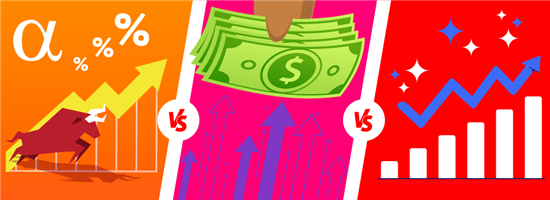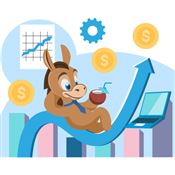Seeking Alpha vs Motley Fool vs Morningstar
Seeking Alpha, Motley Fool, and Morningstar are all outstanding stock-picking platforms. But which one is right for you?
 |
Selecting the right investment research platform can be a lot of work. How do you know which platform is better? Or which one to invest your time and money in?
Read on to find out all you need to know about Seeking Alpha Premium, Motley Fool Stock Advisor, and Morningstar Investor.
Who Each Platform Is Best For
- Seeking Alpha Premium ($299/yr) is best if you're a research-driven stock or ETF investor. The platform offers numerous stock analyses, ratings, and financial data that can guide your investment decision. Find out more.
- Motley Fool Stock Advisor ($199/yr) is best if you're a stock investor who isn't looking to do so much research. They'll offer 2 recommended stocks each month and let you choose which one to buy. Find out more.
- Morningstar Investor ($249/yr) is best if you're a mutual fund or bond investor. They offer fund screeners and fund breakdown analysis. It's also ideal for investors who have stocks or ETFs in their portfolios. Find out more.
Stock Advisor - $99/year for New Members
*$99 is an introductory price for new members only. 50% discount based on current list price of Stock Advisor of $199/year. Membership will renew annually at the then-current list price.
What All Three Offer
Seeking Alpha Premium, Motley Fool Stock Advisor, and Morningstar Investor all offer the following:
- Stock recommendations
- Stock screeners
- Stock analysis
- Educational resources
Now, let's dive into their differences.
Differences
Here are the main differences among the three platforms:
- Motley Fool Advisor only analyzes stocks. Seeking Alpha Premium also has ETFs, while Morningstar Investor also includes mutual funds and bonds.
- Seeking Alpha and Morningstar both offer stock ratings. Motley Fool does not.
Seeking Alpha Premium offers the strongest stock ratings because it has 3 types of ratings: Wall Street analysts ratings, Seeking Alpha authors ratings, and Objective Quant ratings. Morningstar offers 1 rating based on a scale of 1-5 stars.
- Motley Fool gives you 2 stock picks per month. Seeking Alpha and Morningstar have list of top-rated stocks.
- Seeking Alpha and Morningstar let you link all your brokerage accounts. Motley Fool doesn't offer portfolio tracking.
- Seeking Alpha offers crowdsourced content, while Motley Fool and Morningstar's are from their in-house analysts.
- Seeking Alpha and Motley Fool both have strong investor communities. Morningstar doesn't.
Why Choose Seeking Alpha Premium?
Seeking Alpha Premium is the only investment research platform that offers crowdsourced content. Its stock analysis and investment articles are sourced from over 7,000 contributors who are all Premium members.
Seeking Alpha's top-rated stocks have also outperformed the S&P 500 by 4 times over a 12-year period.
This is also the only platform that offers various investing groups. These groups allow you to interact and discuss with other investors who have similar investment strategies. The downside is, you'll have to pay extra to access these groups.
Seeking Alpha also has factor grades that provide you with a quick assessment of each stock according to its growth, value, momentum, profitability, and earnings per share revision.
You may like Seeking Alpha if you:
- Like technical content
- Need varied perspectives from the investing community
- Want to do your own research before buying/selling a stock
|
|
Why Choose Motley Fool Stock Advisor?
Unlike Seeking Alpha, Motley Fool Stock Advisor is simple and direct. It offers two recommended stocks to buy each month. If you're the type of investor who relies on experts' recommendations on where to invest, the Stock Advisor may suit you.
Its stock recommendations have also outperformed the S&P 500 by more than 4 times. That means if you had invested in Motley Fool's stock recommendations instead of in the S&P 500, your investment would have grown more than 4 times.
Motley Fool also provides a list of its 10 best stocks to buy now, selected from over 300 stocks. That gives you enough stock options to choose from.
You may like Motley Fool if you:
- Are a new stock investor
- Rely on expert opinions regarding which stock to buy
- Don't have time to do your own investment research
Stock Advisor - $99/year for New Members
*$99 is an introductory price for new members only. 50% discount based on current list price of Stock Advisor of $199/year. Membership will renew annually at the then-current list price.
|
|
Motley Fool could be better suited for your needs if you don't have time to do your own research and want to pick recommended stocks that could potentially grow over time.
However, Morningstar could be better if you like analyzing stocks and mutual funds to make your own investment decisions.
Why Choose Morningstar Investor?
Morningstar Investor is the only platform that has a portfolio x-ray tool which shows the strengths and weaknesses of your portfolio, including the investment gaps. It also shows you the breakdown analysis of each fund.
Morningstar also offers in-depth reports on thousands of mutual funds and stocks. Its stock research covers 51,000 public companies. This gives you more than enough investment research resources to guide your decisions.
In addition, Morningstar also has a Best Investment feature that provides the top investment picks from Morningstar's in-house analysts. This is useful if you're still thinking about which assets to buy.
You may like Morningstar if you:
- Have a portfolio that largely consists of mutual funds and bonds
- Want to know the geographical spread of your portfolio
|
|
No. Morningstar is a better pick for investment research and analysis, especially for long-term investing. For picking stocks, other platforms like Motley Fool have better track records than Morningstar.
Head-to-Head Comparisons
Not all three platforms offer the same features. Let's take a more detailed look at how they compare.
Pricing
- Motley Fool Stock Advisor: $199/yr[1]
- Seeking Alpha Premium: $299/yr[2]
- Morningstar Investor: $249/yr[3]
Motley Fool Stock Advisor is the cheapest among the three. But it also gives you the least, because it only offers stock research and recommendations. The main service is the 2 stock picks a month.
Morningstar Investor is more expensive than Motley Fool Stock Advisor, but it also covers most investment products. It covers over 600,000 investment products including stocks, ETFs, mutual funds, and bonds.
Stock Advisor - $99/year for New Members
*$99 is an introductory price for new members only. 50% discount based on current list price of Stock Advisor of $199/year. Membership will renew annually at the then-current list price.
Stock Ratings
| Seeking Alpha Premium | Offers three types of ratings | |
| Morningstar Investor | Uses star rating systems | |
| Motley Fool Stock Advisor | No stock ratings |
Motley Fool doesn't have stock ratings but Seeking Alpha and Morningstar do. On top of stock ratings, Morningstar also offers fund ratings.
Morningstar's rating system covers more than 600,000 investment products. This includes 294,000 open-end funds, 12,800 closed-end funds, and over 23,400 exchange-traded funds.[4]
Morningstar is comprehensive in its coverage of funds and indices, but not so much in terms of stocks. It only covers 2,000 stocks.
Morningstar's ratings use a scale of 1 to 5 stars. A stock with a 5-star rating means it's highly undervalued—meaning they're recommending you to invest in that stock.
Seeking Alpha only offers stock ratings, but it comes in three forms: Quant ratings, Seeking Alpha (SA) Authors ratings, and Wall Street Analysts ratings. These three ratings cover around 5,600 stocks.[5]
Yes, Seeking Alpha's stock ratings are accurate. Its Quant ratings are objective evaluations of stocks based on the statistical analysis of each stock's growth, profitability, value, momentum, and earnings per share revision. Its Seeking Alpha authors' ratings are subjective but a reliable gauge of the investing community's sentiment on a particular stock.
Screeners
| Seeking Alpha Premium | Multiple stock screeners | |
| Morningstar Investor | Stocks and funds screeners | |
| Motley Fool Stock Advisor | Screens stocks through analyst ratings |
All three platforms offer screeners. Seeking Alpha and Morningstar both have predefined or built-in screeners. While Motley Fool screens stocks through its analysts' conviction rating.
Seeking Alpha's predefined screeners include a list of Top Stocks by Quant, Top Growth Stocks, and Top Dividend Stocks.
What's unique about Seeking Alpha is it allows you to create your own screener. You get to screen stocks/ETFs according to ratings, author recommendations, performance, or momentum.
On the other hand, Morningstar's edge is in its mutual funds screener. They're the only platform that offers a funds screener.
Morningstar also has a unique tool called Basic Fund Screener. This screens mutual funds according to rating, performance, or category. This helps you to quickly discover funds that match your investing style.
Stock screeners should make your stock research easier, allowing you to filter stocks according to specific criteria. If you're an investor who likes to invest in top dividend stocks, choose a screener with a dividend filter. Always choose a screener that has your specific filter of interest.
Stock Recommendations
| Seeking Alpha Premium | Outperformed the S&P 500 by 4x | |
| Morningstar Investor | No available data | |
| Motley Fool Stock Advisor | Outperformed the S&P 500 by 4x |
Seeking Alpha offers stock recommendations through its list of top-rated stocks. Motley Fool offers 2 recommended stocks to buy each month. And Morningstar offers a list of top-rated stocks and funds.
Seeking Alpha's top-rated stocks are based on its three types of stock ratings. These ratings are derived from its quant analysis model (Quant rating), Seeking Alpha authors (SA authors rating), and Wall Street analysts (Wall Street analysts rating).
Morningstar's stock recommendations are a list of stocks and funds with 5-star ratings. These ratings are from Morningstar's in-house analysts. They assess whether the stock or fund is undervalued or not.
Motley Fool's stock recommendations have outperformed the S&P 500's annual rate by up to more than 4 times, while Seeking Alpha's recommendations have outperformed the S&P 500 by up to 4 times. Morningstar's stock pick performance is currently not available. This might be because Morningstar's primary asset offering is funds and not stocks.
Stock Analysis
| Seeking Alpha Premium | Detailed historical performance of a stock | |
| Morningstar Investor | More comprehensive analysis | |
| Motley Fool Stock Advisor | Tells you why a stock has a bad rating |
Seeking Alpha, Motley Fool, and Morningstar all analyze why a certain stock has a good or bad rating. All three platforms tell you why you should ignore or invest in a particular stock.
However, Morningstar's analysis features are more robust than Seeking Alpha and Motley Fool. Morningstar's stocks/funds recommendation comes with an analyst's deep-dive report.
Morningstar also has a Best Investments section that reveals the best investment ideas in the platform. You can sort these ideas by category depending on the type of investment you want to make.
Nevertheless, Morningstar doesn't have ten years of historical financial statements for every stock—which is accessible and downloadable on Seeking Alpha. If you want to have a detailed view of the historical performance of a stock, Seeking Alpha is the way to go.
Yes, Morningstar is good for stock analysis. Its stock analyst reports offer a comprehensive review of a particular stock. It offers a fair value estimate that helps you see the long-term value of a stock. This helps you see which stocks are undervalued. Morningstar's stock analysis is ideal for those who want to invest in value stocks.
Educational Resources
| Seeking Alpha Premium | Informative but technical | |
| Morningstar Investor | More diverse resources | |
| Motley Fool Stock Advisor | Good for beginners |
All three platforms offer free stock market news and educational resources. They provide free access to articles about investment and investing ideas. However, Motley Fool has more free content than Seeking Alpha or Morningstar.
The three platforms offer informative content. But Seeking Alpha's articles can be overwhelming and too technical, which is targeted towards more advanced investors. This means if you're just starting out, Motley Fool's resources may be a better choice.
Nevertheless, Morningstar offers more diverse educational resources. Morningstar provides worksheets such as goal planning, budget, and net worth worksheets. It also offers a self-study investing course called "Morningstar Investing Classroom."
Seeking Alpha and Motley Fool don't offer worksheets and courses.
Morningstar's Investing Classroom can be accessed for free. It offers several courses on stocks, funds, ETFs, bonds, portfolio, and ESG investing. Some of its stock investing courses include an introduction to financial statements, the purpose of a company, and how to invest for the long run.
Customer Service
Seeking Alpha and Morningstar's customer support team can both be reached through email and phone. Motley Fool's customer support can be reached through phone and through its contact form.
Seeking Alpha:
- Email: subscriptions@seekingalpha.com
- Call: 1-347-509-6837
Motley Fool:
- Email: Customer contact form
- Call: 888-665-3665
Morningstar:
- Email: joe@morningstar.com
- Call: 866-229-9449
Alternatives
Here are the top competitors of Seeking Alpha Premium, Morningstar Investor, and Motley Fool Stock Advisor:
- Zacks Investment Research
Zacks Investment Research offers stock screeners, portfolio management tools, and a stock rating system.You can go to Zacks if you need a rating system that is based on the earnings per share revisions.
Similar to Morningstar, Zacks offers stock research reports. However, unlike Morningstar and Seeking Alpha, Zacks doesn't provide data on stocks with limited market capitalization. In terms of the available research, Zacks is less comprehensive than the two platforms.
- Seeking Alpha's Alpha Picks
Alpha Picks is very similar to the Motley Fool Stock Advisor. Just like the Stock Advisor, Alpha Picks also offers 2 stock recommendations each month.Alpha Picks' stock recommendations are based on the data-driven research of Seeking Alpha's quantitative analysis team.
However, unlike Motley Fool, Alpha Picks does not offer an extra list of 10 stocks that you can buy now.
Bottom Line
Seeking Alpha Premium, Motley Fool Stock Advisor, and Morningstar Investor are all useful investment research platforms. Choosing the right platform largely depends on what type of investor you are.
If you're a stock or ETF investor who likes to make your own investment decisions based on research, then Seeking Alpha is for you.
If you're a stock investor with no time for research and just want stock recommendations, then Motley Fool is an excellent choice.
But if you're more of a fund or bond investor who wants in-depth analysis, then you should choose Morningstar.
References
- ^ Motley Fool. Motley Fool Premium Services, Retrieved 9/14/2023
- ^ Seeking Alpha. Premium, Retrieved 9/16/2024
- ^ Morningstar. FAQ: What's the price of a subscription to Morningstar Investor?, Retrieved 9/14/2023
- ^ Morningstar. Morningstar Ratings, Retrieved 9/14/2023
- ^ Seeking Alpha. Quant Ratings & Factor Grades FAQ, Retrieved 09/12/2023
Stock Advisor - $99/year for New Members
*$99 is an introductory price for new members only. 50% discount based on current list price of Stock Advisor of $199/year. Membership will renew annually at the then-current list price.
$20 Investment Bonus
- Open an Acorns account (new users only)
- Set up the Recurring Investments feature
- Have your first investment be made successfully via the Recurring Investments feature
Write to Del Exconde at feedback@creditdonkey.com. Follow us on Twitter and Facebook for our latest posts.
Note: This website is made possible through financial relationships with some of the products and services mentioned on this site. We may receive compensation if you shop through links in our content. You do not have to use our links, but you help support CreditDonkey if you do.
|
|
| ||||||
|
|
|
Compare:










